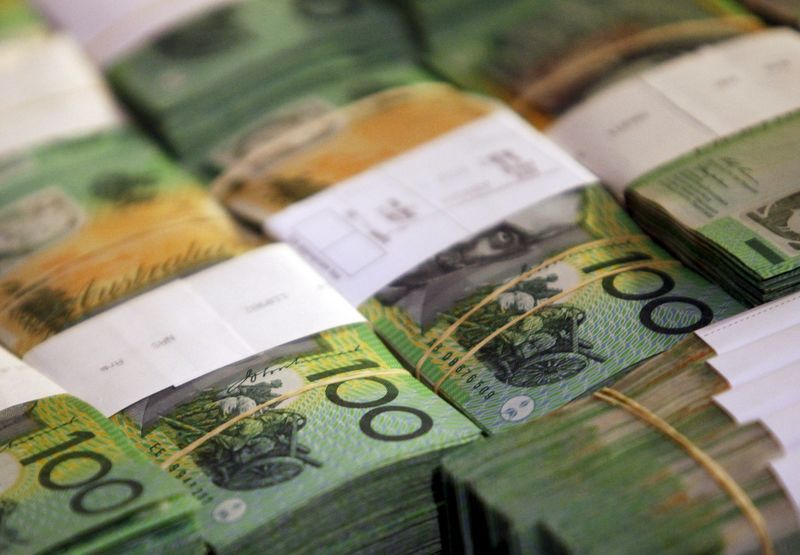By Wayne Cole
SYDNEY, April 6 (Reuters) - It's a vote of confidence Reserve Bank of Australia (RBA) Governor Glenn Stevens would really rather not have right now.
His global peers have been buying Australian government bonds, drawn by its gold-plated credit rating and yields that are positively sumptuous compared to the sub-zero fare on offer in Europe and Japan.
But all this demand, combined with the aggressive easing policies of these same central banks, is pushing up the Australian dollar and threatening to throttle a much-needed revival in export sectors such as tourism and education.
The wine industry, for one, has blossomed since the Aussie fell back below parity with the U.S. dollar in 2013, after the mining boom peaked, and began a long decline that saw it drop below $0.70 this year.
Last year, wine exports rose 17 percent to $2.1 billion.
Mitchell Taylor, managing director at Taylors Wines, remembers the Aussie's ascent above parity as tough for the industry. "Our wines were getting substituted by the other exporting wine nations that had a currency advantage over us."
The currency's subsequent decline was a boon, allowing the South Australian winery to ramp up its global marketing operations. It now exports a quarter of its product and was planning to double that in three years, but sustained revival in the Aussie would threaten all that.
COMPLICATION
After the RBA's policy meeting this week, Stevens singled out the rising Australian dollar as a "complication" the economy could do without, and left the door ajar for a cut in interest rates to reduce the currency's appeal should it be necessary.
Yet the central bank's protestations are tinged with resignation.
"Almost every central bank would like a lower currency, some say that openly and some don't actually articulate it," Steven's deputy, Philip Lowe, acknowledged in a recent speech. "But everyone is in that basket and of course it can't work out for everyone...because exchange rates are relative prices."
The sheer amount of Aussie dollars bought by foreign central banks makes clear just what the RBA is leaning against. Foreign exchange reserves data out last week on from the International Monetary Fund showed holdings of the Aussie surged 34 percent in 2015 to reach roughly A$177 billion.
That compared to a rise of just 5 percent over 2014.
The IMF reports reserves in U.S. dollars only, but notes that they can be converted into other currencies by using market exchange rates for the end of the quarter.
The Aussie made up 1.9 percent of the world's allocated reserves at the end of last year. That was up from 1.78 percent in 2014 even as the U.S. dollar climbed steadily in value.
That share might sound like a drop in the ocean, but it's a very deep ocean. Total reserves of the 144 countries that report to the IMF stand at $10.9 trillion.
IT'S ALL RELATIVE
The Aussie's attraction is partly a function of Australia's relative success in dodging the global financial crisis. The RBA has held its cash rate at 2 percent for 10 months, while rates in the euro zone and Japan are negative.
Australian 10-year government debt yields 2.46 percent. In Germany, investors get 13 basis points, while in Japan they have to pay 8 basis points for the privilege of lending money to the government for 10 years.
Since the Bank of Japan adopted negative rates earlier this year, investment flows out of the country have only got larger, and some of that is washing up on the shores of Australia.
Data from Japan's Finance Ministry shows Japanese investors bought almost 11 trillion yen ($98 billion) of foreign assets in the first quarter, and over 8 trillion of that went into bonds.
"The outlook for Japanese demand for higher-yielding foreign assets looks like it is accelerating into April," noted Robert Rennie, chief currency strategist at Westpac.
"Australian yields remain super-attractive and increased Japanese buying of A$ assets should be expected."
Foreign investors already hold 64 percent of Australia's government debt, worth around A$280 billion, up from less than A$50 billion before the global financial crisis.
Such flows were a major reason the Aussie surged more than 7 percent in March, the sharpest monthly gain in over four years.
It briefly topped 77 U.S. cents at one stage, a rise that risks spilling over into all sorts of export-sensitive sectors.
"We would prefer the dollar to sit around the 66-67 U.S. cent mark rather than where it is today," says Taylor of Taylors Wines.
"If it gets into the mid-80s...then it would make things quite difficult."
